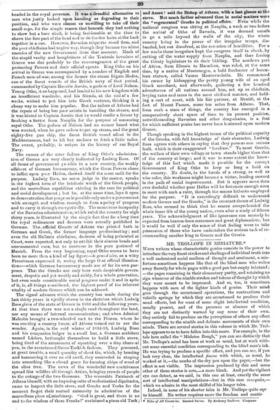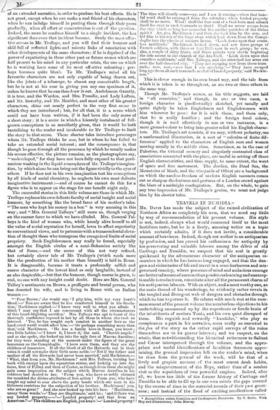MR. TROLLOPE IN MINIATURE.*
Wrrn writers whose characteristic genius consists in the power to introduce the very finest strokes and shadings of individual truth into a well understood social medium of thought and sentiment, a mis- fortune sometimes happens like that of the blind man who writes away fluently for whole pages with a good pen but empty inkstand ; —the pages remaining in their elementary purity, and retaining no sign whatever of the nimble strokes and tokens of thought by which they were meant to be impressed. And so, too, it sometimes happens with men of the lighter kinds of genius. Their mind goes through the accustomed operations, the contractions and volatile springs by which they are accustomed to produce their usual effects, but for want of some slight intellectual condition, usually present, and of the presence or absence of which they are not distinctly warned by any sense of their own, they entirely fail to produce on the perceptions of others any effect corresponding to the nimble and delicate movements of their own minds. There are several stories in this volume in which Mr. Trol- lope appears to us to have fallen into this snare. For example, in the tale here called the " Misletoe Bough," you can see distinctly that Mr. Trollope's mind has been at work as usual, but at work with- out some essential condition corresponding to the blind man's ink. He was trying to produce a specific effect, and you can see, if you look very close, the intellectual finesse with which, as usual, he worked at it,—the marks of the dry pen upon the paper,—but the effect is not visible. The impression produced by this and some other of these stories is zero,—a mere blank. And yet the vigilant eye can detect, as we said, in this one at least, exactly the same sort of intellectual manipulations—but in this case man gules,— which we admire in the most skilful of his longer tales.
Indeed, in none of his shorter tales is Mr. Trollope quite equ to himself. No writer requires more the freedom and contin
• Tares of All Countries. Second Sean. By Anthony Trollone. Chapman
of an extended narrative, in order to produce his best effects. He is not great, except when he can make a real friend of his characters, when he can indulge himself in putting them through their paces gradually, when all effort at concentration is out of the question.
Indeed, the more he confines himself to a single incident, the less significant does even that incident become. Study the most effec- tive scenes in Mr. Trollope, and you will find their humour and skill full of reflected lights and minute links of association with other developments of the same characters ; if he is deprived of the power of expatiating in those other past or future scenes which are half present to his mind in any particular crisis, the one on which he is working loses some of its most effective colouring ; per- haps becomes quite blank. To Mr. • Trollope's mind all his favourite characters are not only capable of being drawn out, like the joints of a telescope, to almost any conceivable length, but he is not at his ease in giving you any one specimen of it,
unless he knows that he can thus draw it out. Archdeacon Grantly, it is true, and the Warden, and Mrs. Proudie, and Lady Lufton,
and Mr. Sowerby, and Mr. Moulder, and most other of his greater characters, shine out nearly perfect in the very first scene in which they are introduced ; but, for all that, it is a scene which could not have been written, if it had been the only scene of a short story : it is a scene in which a leisurely instalment of full- grown conceptions is so manifestly given, that it would be both tantalizing to the reader and intolerable to Mr Trollope to limit the story to that scene. These shorter tales introduce personages whom Mr. Trollope thinks he sees, but in whom he has failed to take an extended social interest ; and the consequence is, that though he goes through all the processes by which he usually makes his scenes effective, the picture remains, as the photographers say, " undeveloped," for they have not been fully exposed to that perti- nacious washing in the liquid atmosphere of Mr. Trollope's imagine- tion, by which alone he can bring out the figure vividly to the eyes of others. If he does not in his own imagination test his conceptions by all kinds of social chemistry, he neglects his own most delicate imaginative instrument :—and of course he cannot do this for a figure who is to appear on the stage for one benefit night only.
The successful stories in this little volume are those in which Mr. Trollope replaces his own delicate faculty of social insight and social humour, by something like the broad farce of his mother's tales.
" The man who kept his money in a box" is very amusing in this way ; and " Mrs. General Talboys " still more so, though -verging on the coarser farce to which we have alluded. Mrs. General Tal- boys is the kind of woman who, while keenly alive herself to all
the value of social reputation for herself, loves to affect superiority
to conventional views, and to patronizewith a transcendental eleva- tion of thought those who transgress the recognized limits of social
propriety. Such Englishwomen may really be found, especially .amongst the English circles of a semi-Bohemian society like that of Rome,—and the scene of this not very refined, but certainly clever tale of Mr. Trollope's (which reads more like the production of his mother than himself) is laid in Rome.
It is disagreeable, because it treats a profoundly selfish and coarse character of the lowest kind as only laughable, instead of as also despicable,—but that the humour, though coarse in grain, is real, no one with any insight could doubt. Here are Mrs. General Talboy's sentiments on Brown, a profligate and brutal person, who has deserted his wife, and is living in Rome with an Italian
-woman :— "' Poor Brown ;' she would say, I pity him, with my very heart's blood.'—' You are aware that he has comforted himself in his desola- tion,' Mackinnon replied.—' I know very well to what you allude. I think I may say that I am conversant with all the circumstances of this heart-blighting sacrifice.' Mrs. Talboys was apt to boast of the thorough confidence reposed in her by all those in whom she took an interest. ' Yes, he has sought such comfort in another love as the hard cruel world would allow him.'—' Or perhaps something more than that,' said Mackinnon. He has a family here in Rome, you know ; two little babies.'—' I know it, I know it,' she said. ' Cherub angels !' and as she spoke, she looked up into the ugly face of Marcus Aurelius; for they were standing at the moment under the figure of the great horseman on the Campidoglio. I have seen them, and they are the children of innocence. If all the blood of all the Howards ran in their veins it could not make their birth more noble.'—' Not if the father and mother of all the Rewards had never been married,' said Mackinnon.— 'What, that from you, Mr. Mackinnon!' said Mrs. Talboys, turning her back with energy upon the equestrian statue, and looking up into the faces, first of Pollux and then of Castor, as though from them she might gain some inspiration on the subject which Marcus Aurelius in his coldness had denied to her. From you, who have so nobly claimed for mankind the divine attributes of free action From you, who have taught my mind to soar above the petty bonds which one man in his littleness contrives for the subjection of his brother. Mackinnon ! you, who are so great !' And she now looked up into his face. Mackinnon, unsay those words.'—' They are illegitimate,' said he ; and if there was any landed property—'—' Landed property ! and that from an
American The children are English, you know.'—' Landed property !
The time will shortly come—ay, and I see it coming—when that hate- ful word shall be expunged from the calendar ; when landed property shall be no more. What ! shall the free soul of a God-born man submit itself for over to such trammels as that? Shall we never escape from the clay which so long has manacled the subtler particles of the divine spirit ? Ay, yes, Mackinnon ;' and then she took him by the arm, and led him to the top of the huge steps which lead down from the Campi- doglio into the streets of modern Rome. 'Look down upon that count- less multitude.' 3lackinnon looked down, and saw throe groups of French soldiers, with three or four little men in each group ; he saw, also, a couple of dirty friars, and three priests very slowly beginning the side ascent to the church of the Ara Look down upon that countless multitude,' said Mrs. Talboys, and she stretched her arms out over the half-deserted city. ' They are escaping now from these tram mels,- now, now,—now that I am speaking.'—' They have escaped long ago from all such trammels as that of landed property,' said Mackin- non."
This is clever enough in its own broad way, and the tale from which it is taken is so throughout, as are two or three others in the same way.
Though Mr. Trollope's scenes, as his title suggests, are laid in " all countries," and though, in one or two cases, a foreign character is (ineffectually) sketched, yet usually and quite rightly he takes Englishmen and Englishwomen with him wherever he goes: for it is with them, and them only, that he is really familiar ; and the foreign local colour, though it is used effectively in one or two instances, is a mere ground-colour to bring into greater relief his English charac- ters. Mr. Trollope's art consists, if we may, without pedantry, use a mathematical illustration, in a sort of " calculus of finite dif- ferences" applied to the characters of English men and women moving usually in the middle class. Sometimes, as in the case of Palestine, the Oriental scenery and singularly contrasted class of associations connected with the place, are useful in setting off these English characteristics, and thus supply, to some extent, the want of space and free movement. The Jordan, the Dead Sea, the Mountains of Moab, and the vineyards of Olivet are a background on which the careless freedom of modern English manners comes out as sharp as the features and gestures of a London crowd against the blaze of a midnight conflagration. But, on the whole, to gain any true impression of Mr. Trollope's genius, we must not judge him by his shorter tales.



























































 Previous page
Previous page